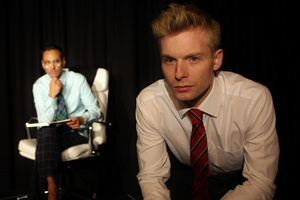Review: INNOCENCE, Bread & Roses Theatre
John Patterson writes and directs a multi-faceted and hard-hitting play about grooming that questions our own bias.

![]() There aren't that many plays that deal with grooming and David Mamet's Oleanna is the one piece that always springs to mind. Even then, we have an older professor accused of sexual harassment by one of his students. What happens when we shift the point of view and it's a young boy who reports his sports teacher? John Patterson responds to that scenario with a multi-faceted and hard-hitting play that challenges our approach to the matter in question. Innocence isn't the answer to the problem, it doesn't strive to be either nor it's provocative for the sake of being so. Once the show is over, it feels like he's put a picture in front of his audience and is now asking to describe it. It demands a discussion over drinks right after.
There aren't that many plays that deal with grooming and David Mamet's Oleanna is the one piece that always springs to mind. Even then, we have an older professor accused of sexual harassment by one of his students. What happens when we shift the point of view and it's a young boy who reports his sports teacher? John Patterson responds to that scenario with a multi-faceted and hard-hitting play that challenges our approach to the matter in question. Innocence isn't the answer to the problem, it doesn't strive to be either nor it's provocative for the sake of being so. Once the show is over, it feels like he's put a picture in front of his audience and is now asking to describe it. It demands a discussion over drinks right after.
It's a Monday, over the summer holidays. After getting off a Zoom meeting with his school's headmaster, a Man answers a knock on the door expecting a delivery. The police shows up instead, kick-starting what will become a living nightmare for this boarding school sports teacher. An ex-student has reported him and he's being arrested for suspicion of grooming, his personal belongings are collected, and he's taken to a prison cell. In the meantime, the Boy recollects his younger years and the events that shaped him. His issues with his stepfather and his feeling of neglect and abandonment take up a big part of his monologue as he takes refuge in extra-curricular activities and becomes captain of his football team.
It's with this latter achievement that he starts being closer to his coach and teacher. He's immediately uncomfortable by the level of familiarity the adult shows him and he - perhaps subconsciously - fights it, struggling to call him by his first name when they're alone. At the other end of the stage, the Man's life's being turned upside down. He details his life at the school, his love for teaching, and the nature of the relationship with his students over the years. It all seems to check out, nothing out of the ordinary. Then, he brings up some unconventional methods of contacting his pupils, like texting and Facebook Messenger, and we enter a grey area. It's as the Boy explains his uneasiness and the Man professes his innocence that our own worldview comes into question.
The unnamed characters (although it transpires that the teacher's an Andy) could be anybody. Our opinion of them keeps changing and twisting on itself. How can we believe the Man without invalidating the Boy's experience? The latter's discomfort and self-hatred during his school years ruined much of his adulthood, but has it only been a misunderstanding or is there something more? Has his crooked relationship with the men around him actively altered his perception of his teacher? Patterson calls out our own sexist bias - if the Boy was a girl, we'd probably be screaming for retribution, but we're left pondering the situation even though the Man's actions crossed a clear line.
Patterson's writing is largely literary, but flows as a monologue in spite of its rather unnatural pattern. Malcolm Jeffries has a crisp, perfectly charismatic RP accent as the Man, but turns cockney and brash when he reports the policemen's words. Theo Watt is the vulnerable and hurt Boy. While Jeffries is collected and dignified even at his lowest, Watt's performance is more and more controlled by his character's emotions. Ultimately, Innocence is a case study at its core. Writing and direction become a means to present a moral dilemma. While on second thought it's not a surprise that we're inclined to second-guess the Boy's account of the events, it's a shocking discovery nonetheless. It's a joy to see theatre doing what it does best, which is making people think.
Innocence runs at the Bread & Roses Theatre until 13 November.
Reader Reviews
Videos

